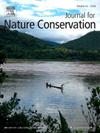全球变暖会影响生态盈余吗?
IF 2.5
3区 环境科学与生态学
Q2 BIODIVERSITY CONSERVATION
引用次数: 0
摘要
本文采用两阶段最小二乘方法,从全球视角探讨了1992 - 2020年全球变暖对122个国家生态盈余的影响。结果表明,全球变暖通过单位GDP二氧化碳排放量的增加、资源租金和林地面积的减少而减少了生态盈余。异质性分析表明,低纬国家生态盈余随全球变暖而减少,中高纬国家生态盈余不受全球变暖的影响。此外,全球变暖对发达国家的生态盈余有正向影响,对发展中国家的生态盈余有负向影响。全球变暖对能源密集型国家的生态盈余也有不利影响,但对低能源密集型国家的生态盈余没有不利影响。此外,全球变暖减少了非洲联盟(AU)国家的生态盈余,但对欧盟(EU)和亚太经合组织(APEC)国家没有影响。人口老龄化进一步降低了全球变暖对生态盈余的影响。本研究为维护生态剩余和生态系统提供了依据。本文章由计算机程序翻译,如有差异,请以英文原文为准。
Does global warming affect the ecological surplus?
This paper discusses the influence of global warming on the ecological surplus in 122 countries from 1992 to 2020 from a global perspective using a two-stage least squares approach. The robust results show that global warming has reduced the ecological surplus through an improvement in carbon dioxide emissions per unit of GDP and reductions in resource rents and forestland. Heterogeneity analyses reveal that the ecological surplus decreases with global warming in low-latitude countries and is unaffected by global warming in middle- and high-latitude countries. In addition, global warming positively affects the ecological surplus of developed countries but negatively affects that of developing countries. Global warming also has an adverse impact on the ecological surplus in energy-intensive countries but not on that in low-energy-intensity countries. Additionally, global warming reduces the ecological surplus for African Union (AU) countries but has no effect on European Union (EU) or Asia-Pacific Economic Cooperation (APEC) countries. Also, population aging further reduces the impact of global warming on the ecological surplus. This study provides evidence for maintaining the ecological surplus and ecosystems.
求助全文
通过发布文献求助,成功后即可免费获取论文全文。
去求助
来源期刊

Journal for Nature Conservation
环境科学-生态学
CiteScore
3.70
自引率
5.00%
发文量
151
审稿时长
7.9 weeks
期刊介绍:
The Journal for Nature Conservation addresses concepts, methods and techniques for nature conservation. This international and interdisciplinary journal encourages collaboration between scientists and practitioners, including the integration of biodiversity issues with social and economic concepts. Therefore, conceptual, technical and methodological papers, as well as reviews, research papers, and short communications are welcomed from a wide range of disciplines, including theoretical ecology, landscape ecology, restoration ecology, ecological modelling, and others, provided that there is a clear connection and immediate relevance to nature conservation.
Manuscripts without any immediate conservation context, such as inventories, distribution modelling, genetic studies, animal behaviour, plant physiology, will not be considered for this journal; though such data may be useful for conservationists and managers in the future, this is outside of the current scope of the journal.
 求助内容:
求助内容: 应助结果提醒方式:
应助结果提醒方式:


